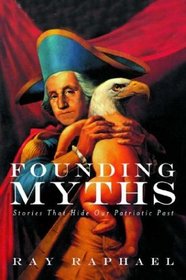This book presents 13 myths in early American history, breaks down the elements of truth, then analyzes why each myth has been perpetuated for so long. Some of these myths, such as Molly Pitcher, I was familiar with. Others, such as Valley Forge not being the worst "long hard winter" encampment (actually happened later in Morristown, NJ, but Valley Forge didn't have the mutinies and other undesirable stories that the Morristown encampment had). I was really impressed by one of the chapters (might have been the last one, but I don't remember) which reminds everyone that the American Revolution also had battles that took place outside of America (France and Britain still hated each other and fought their own battles in conjunction with fighting each other in America, I never really thought of the American Revolution as a global conflict, but I guess it really was). I also liked the ongoing message of the American Revolution being a movement led by the people, not just the "Founding Father" figureheads we usually associate with it. At the end of the book, Ray Raphael gives information on where to find lesson plans related to what was in the book. I checked out a few and if I ever teach US history again, I might use some elements of them (I teach Ancient World now, so it doesn't work for me at the moment). One thing that bothered me was that it seemed like the author was doing a lot of "I told you so"ing by showing where history texts tend to eliminate information, but without giving clear examples of where texts get the information correct. After all, he had to get his information from somewhere (I know there's the super long bibliography at the end, but I mean he could have given credit by stating that a certain source does tell the whole story, or at least most of the true story. All in all, it was a very interesting read!
Search -
Founding Myths: Stories That Hide Our Patriotic Past
Founding Myths Stories That Hide Our Patriotic Past
Author:
The tall tales that parade as historical facts. Did you know that:
Author:
The tall tales that parade as historical facts. Did you know that:
- The legend of Paul Revere's Ride was invented by a poet in 1861, eighty-six years after the fact?
- Thomas Jefferson was not seen as the architect of American equality until Abraham Lincoln assigned him that role four score and seven years later?
- Molly P... more »
ISBN-13: 9781565849211
ISBN-10: 1565849213
Publication Date: 8/2004
Pages: 354
Rating: ?
ISBN-10: 1565849213
Publication Date: 8/2004
Pages: 354
Rating: ?
0 stars, based on 0 rating
Publisher: New Press
Book Type: Hardcover
Other Versions: Paperback
Members Wishing: 0
Reviews: Member | Amazon | Write a Review
Book Type: Hardcover
Other Versions: Paperback
Members Wishing: 0
Reviews: Member | Amazon | Write a Review
Please Log in to Rate these Book Reviews
Genres:
- History >> Americas >> United States >> General
- History >> Americas >> United States >> Revolution & Founding >> General
- History >> Historical Study & Educational Resources >> Historiography
- Literature & Fiction >> World Literature >> Mythology >> General
- Nonfiction >> Social Sciences >> Folklore & Mythology




